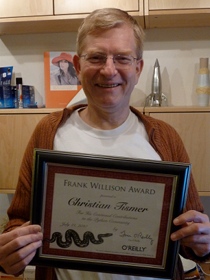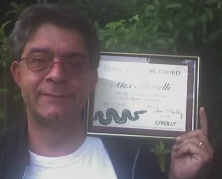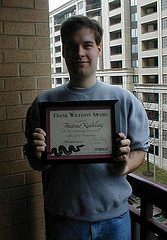Frank Willison Memorial Award
Contributions can encompass so much more than code. A successful software community requires time, dedication, communication, and education as well as elegant code. With the Frank Willison Memorial Award, we hoped to acknowledge all of those things.
—Tim O'Reilly
The Frank Willison Memorial Award for Contributions to the Python Community is given annually to a person judged to have made an outstanding contribution to the Python community. The award was established in memory of Frank Willison, a Python enthusiast and O'Reilly editor-in-chief, who died in July 2001. Tim O'Reilly wrote In Memory of Frank Willison, which includes a collection of quotes from Frank's insightful and witty writing. O'Reilly Media maintains an online archive of Frank Willison's column, "Frankly Speaking".
O'Reilly Media presents the Frank Willison Memorial Award annually at OSCON, the O'Reilly Open Source Convention. The recipient is chosen by the board of directors of the Python Software Foundation. The award consists of a framed certificate and one free pass to a future OSCON.
Award Recipients:
- Carol Willing (2019)
- Audrey Roy Greenfeld and Daniel Roy Greenfeld (2018)
- Katie Cunningham and Barbara Shaurette (2017)
- Brett Cannon (2016)
- Jessica McKellar (2015)
- Barry Warsaw (2014)
- Anna Martelli Ravenscroft (2013)
- Jesse Noller (2012)
- Georg Brandl (2011)
- Christian Tismer (2010)
- Mark Hammond (2009)
- Martin von Löwis (2008)
- Steve Holden (2007)
- Alex Martelli (2006)
- Cameron Laird (2004)
- Fredrik Lundh (2003)
- Andrew Kuchling (2002)
Unfortunately, due to a lapse in coordination, there was no award in 2005.
Carol Willing (2019)
Carol Willing was honored in recognition of her technical contributions to Jupyter and as a core developer, as well as her community contributions as a member of the PSF Code of Conduct Work Group, a former board member, contributor to many PyCons, and as a member of the Python Steering Council.
Audrey Roy Greenfeld and Daniel Roy Greenfeld (2018)
Audrey and Daniel were honored for their contributions to the development of Python and the global Python community through their speaking, teaching, and writing.
Katie Cunningham and Barbara Shaurette (2017)
The Python Software Foundation has awarded the 2017 Frank Willison Award to Katie Cunningham and Barbara Shaurette in recognition of their work to create and run their Young Coders classes, along with freely distributing their teaching materials.
The program began at PyCon 2013 and was an immediate success. The followup blog post is the second most popular post in PyCon's history by a wide margin, and the event was one of the most talked about topics of the conference.
“I don't think you'd ever see that kind of experimentation in a classroom full of adults, who would more likely do everything in their power not to break their computers,” Barbara wrote of the kids’ ability to learn, write, and run code.
Since it's beginnings in Santa Clara it has been run at several other conferences, such as PyTennessee, and PyOhio, again at PyCon 2017.
We thank Katie and Barbara for their work in actively promoting and teaching Python to a new generation of programmers.
Brett Cannon (2016)
In the open source community, project management is an often underrated skill: given a problem to be solved, and a proposed solution for solving it, define the concrete steps necessary to get a group of volunteers from the point of saying "We should do something about this" to "We have solved that problem". As Tim O’Reilly has said, “Contributions can encompass so much more than code. A successful software community requires time, dedication, communication, and education as well as elegant code. With the Frank Willison Memorial Award, we hoped to acknowledge all of those things.”
For the Python core development community, Brett Cannon has repeatedly volunteered to handle project management responsibilities that have significantly improved the core development infrastructure, from the migration to the dedicated bugs.python.org infrastructure, to the initial switch to a distributed version control system, to the current adoption of a more automated development workflow.
A Python core developer since 2003, Brett has also dedicated significant time to ensuring that the design, implementation, and development of essential parts of the CPython reference interpreter are accessible to new contributors, including (but not limited to) writing the initial version of the CPython developer's guide, the initial version of the design documentation for the current CPython compiler, converting the bulk of the import system implementation from C to Python, creating the "devinabox" project to make it easier for new contributors to get started at development sprints, writing the "Python-dev Summaries" articles from 2002 to 2005, and moderating the python-ideas mailing list since its introduction in December 2006.
Brett has served on the PSF Board of Directors from 2006-2010, and again from 2013-2014, and was PSF Vice President in 2006-2007, and Executive Vice President from 2007-2010. He is also a gracious ambassador for the Python development community. His thoughtful manner, genuine kindness, and sense of humor have inspired many at PyCons over the years. Whether helping a new contributor understand a code snippet at a sprint or encouraging a new speaker with his confidence in them, Brett shares his positive character with us. Everyone should be fortunate enough to have Brett on their team. He gives selflessly and impacts Pythonistas and the Python language in so many ways.
Jessica McKellar (2015)
Jessica McKellar has served in many distinguished roles within the Python community: Director, Python Software Foundation; PyCon Diversity Outreach Chair; core organizer of Boston Python, one of Python’s largest user groups; frequent keynote speaker and tutorial presenter; board member of OpenHatch; Boston Python Workshop organizer and evangelist; PSF Fellow; mentor for Outreachy program; core contributor to OpenHatch and Twisted projects. She’s also has a long history as a Python advocate as a book author (Twisted Network Programming), training author (Introduction to Python), startup founder, VP of Engineering, and MIT alumna in Computer Science.
Jessica’s tireless dedication to outreach and education created fundamental change in the Python community. In 2011, only 1% of talks given at PyCon were presented by women. Jessica’s outreach efforts included hundreds of individually targeted emails to women in technology, encouraging women to submit talk proposals, and mentoring many through the entire proposal process. In 2014 and 2015, a full 33% of talks at PyCon were given by women.
As a volunteer with genuine commitment to the education and success of others, Jessica spends a significant amount of her time on outreach, encouraging new leaders in the Python community, and sharing how Python education empowers others to change the world. She has touched many Python community members, directly and indirectly, with her grace, intelligence, and humble willingness to listen, collaborate, and celebrate the contributions of others.
Barry Warsaw (2014)
Barry Warsaw has been a Python core developer since 1995. Barry is the lead developer of the enormously popular Mailman list manager (written in Python, naturally), and contributed large parts of the related 'email' standard library module. He has vigorously advocated for Python 3 adoption; he has helped with infrastructure; with the security list; and he has been Python release manager for several versions. Barry has worked for Canonical since 2007, focusing especially on Python support in the popular Ubuntu Linux distribution.
Anna Martelli Ravenscroft (2013)
Anna Martelli Ravenscroft received the Frank Willison Award for her book authorship, volunteer work at PyCon and OSCon, and public speaking.
Anna has spoken repeatedly at both PyCons around the world, and at OSCon in previous years, about diversity and outreach efforts in the Python community and in open source communities more generally, adding a fresh perspective on diversity in software development.
She has been a valued contributor to the PSF Outreach & Education Committee and has tirelessly volunteered as an organizer at PyCon and OSCON.
Jesse Noller (2012)
Jesse has been a core contributor to CPython since 2008, focusing his development efforts on the multiprocessing module. However, much of his Python contribution over the years has occurred outside of the development team. After being elected to the PSF in 2009, he was elected to the Board of Directors in 2010. After two years leading PyCon's Program Committee, Jesse became the conference's Chairman in 2012 and put together the largest and most successful conference to date.
Jesse has also helped spawn the Python Sprints project, Python Core mentorship project, created the Outreach and Education committee, is driving the revamp of the Python.org site and infrastructure, and is involved in other community projects. His primary focus is the Python community's outreach, growth, and long term success.
The video announcing Jesse's award at OSCON 2012 is available on YouTube.
Jesse is a Principal Software Engineer at Nasuni where he leads the development of the management and user interfaces for Nasuni's Filer product. At Nasuni he uses Python everywhere, from the core of the product up through the interfaces, tools, and testing.
When he's not working on Python, PyCon, or other PSF projects, he partakes in fitness activities and spends time with his wife Dusty and their two beautiful daughters.
Georg Brandl (2011)
Georg has been a core contributor to CPython since 2005, contributing bug fixes for compiler internals and modules such as pdb. His most widely known contributions are to Python's documentation, through writing as well as by creating and maintaining the Sphinx tool chain for converting reStructuredText input files to more easily consumed formats such as HTML and PDF.
The video announcing Georg's award at OSCON 2011 is available on YouTube.
Georg is a PhD student of Physics. He works at the Munich research reactor slash neutron source on magnetism, researching novel materials for the computing of tomorrow. He uses Python to control experiments consisting of dozens of individual devices, and for teaching other scientists how to do so efficiently.
When he is not working on Python-related projects, Georg likes to cycle and to cook.
Christian Tismer (2010)

Christian Tismer's contributions to the technology behind Python have focused on performance. For example, he is the founder of the Stackless Python project, a micro-threading system with the first implementation of generators and continuations. You can learn more about Stackless from the project's history page and this IBM developerWorks interview with Christian by David Mertz.
Christian also co-founded PyPy, an implementation of Python in Python, with Armin Rigo and Holger Krekel. Christian worked on PyPy full time for a period, using EU funding. Later, he worked on the JIT compiler Psyco with Raymond Hettinger to create Psyco V2. Most recently, he has been employed by CCP Games to work on combining Stackless and Psyco and updating them to support 64-bit systems.
In 1997, as one of his earliest contributions to the Python community, Christian launched the Starship Python website…
When he's not working on Python, Christian enjoys watching movies, reading, and playing piano. You can follow him on twitter @ctismer.”
Mark Hammond (2009)
Mark Hammond, author and long-term maintainer of the pywin32 package and PythonWin, has been a long-term contributor to Python. Without his contributions it is likely that the Windows platform would be a much less significant part of the Python landscape.
Mark created software that made Python immeasurably more valuable to the Windows community, thereby ensuring that Python was not consigned to the "Linux/UNIX open source" category. He also created the first implementation of Python for Microsoft's .NET environment, was a major contributor to ActiveState's place in the Python world, and has more recently acted as Python ambassador to the Mozilla community.
Mark is also (jointly with Andy Robinson) the author of an O'Reilly title, Python Programming on Win-32.
Martin von Löwis (2008)

Martin von Löwis continues to be a tireless worker on behalf of the Python community. He has been a long-term contributor to the Python core, and regularly answers questions on the Python developers' and users' mailing lists. A PSF director since 2002, he was also the prime mover in transitioning the Python development infrastructure from SourceForge, and has created several Roundup issue trackers for various areas. He chaired the PSF Grants Committee, which among other achievements kept Jython alive when its future looked uncertain.
Steve Holden (2007)

In 2003 Steve Holden founded and chaired the first Python community conference, establishing PyCon as the premier event for Pythonistas in North America. Steve again chaired PyCon in 2004 and 2005. Steve is the author of Python Web Programming, and a frequent blogger and contributor to the Python newsgroup, comp.lang.python. He has served on the Python Software Foundation's Board of Directors since 2004. Steve provides consulting and training services through his company, Holden Web.
Although sadly I never met Frank Willison his spirit permeates the Python community, and has inspired me in my efforts to serve that community. I am honored to join such a prestigious list of recipients. Thank you.
Alex Martelli (2006)

Prolific writer and community member Alex Martelli was selected as the recipient of the 2006 Frank Willison Award. Alex's books include Python in a Nutshell and the Python Cookbook (editor). Alex has written a brief biography relating his Journey to Python.
Cameron Laird (2004)
Cameron Laird is best known in the Python world for his writing: in 1997 he characterized the language for Sunworld readers as "reliable", "suitable for programming in the large", "clean, modern, portable, and extensible", and with "better aesthetics". In 1998, he published the first report on JPython, the first popular "batteries-included" profile of Python, and began editing the weekly "Python-URL!" digest. Subsequent years saw him write about GUI toolkits, Web frameworks, Stackless, IronPython, Web Services, Pyrex, Python-focused books, and much more. He also manages the Tkinter mailing list, occasionally contributes to specialized extensions including Pexpect, pysnmp, python-ldap, and so on, and bases much of the development of his own company, Phaseit, Inc., on Python.
I claim an even stronger proposition: Python is the single best language for most beginners. Its applicability is as wide as any language (yes, including C and Java), and it's quite inviting to first-timers.
Python is the single best general-purpose computing language we now have--better'n C, or Java, or anything else.
Fredrik Lundh (2003)
Fredrik Lundh is well known by his nickname "effbot", so named because of his prolific contributions to the comp.lang.python newsgroup over the years. They became so numerous, in fact, that they became the basis for his book, (the eff-bot guide to) The Python Standard Library. Fredrik is also the author of or major contributor to the PIL, SRE, xmlrpc, Tkinter and Unicode Python packages, among others. Fredrik is a principal of Secret Labs AB.
Andrew Kuchling (2002)

Andrew is a prolific programmer and the author of many articles, including the extensive "What's New in Python" series, published for each version of Python since 2.0. Since receiving the Frank Willison Award, Andrew has served on the PSF Board of Directors and he co-chaired the 2006 & 2007 PyCon community conferences in Dallas, Texas. Andrew is now operating a consulting firm, Green Dragonfly LLC.
